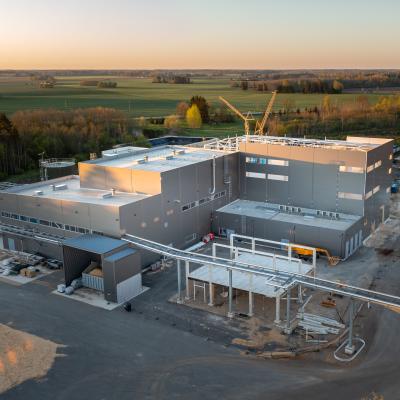The SWEETWOODS project is building a first-of-its-kind biorefinery in Estonia to maximise the use of wood and increase its value in support of sustainable forest management. The first-of-its-kind flagship biorefinery in Estonia converting at least 90% of the wood into functional bio-based chemicals at an industrial scale.
The extraordinary features of wood
Trees cover about 30% of our planet’s surface and house millions of plant and animal species. They purify the air and produce oxygen, protect soils against erosion and improve water quality. At the same time, trees are part of the largest renewable biomass on Earth, plants. Wood is a circular material used for a boundless number of purposes in our daily lives. Sustainable forest management is, therefore, key to keeping ecosystems healthy while ensuring the availability of green materials.
The SWEETWOODS project team aims for a paradigm shift in the forest-based industries by helping them to reach the full potential of all the tree parts and ultimately leading to less waste.
In traditional wood processing industries, only 40-50% of the wood is transformed into valuable products. The rest is burned to generate heat, electricity and steam for the production plants. This lower-quality wood, however, contains three valuable components, lignin, hemicellulose and cellulose, which could be turned into high-quality bio-based ingredients and products.
The mission of SWEETWOODS is to convert at least 90% of the wood into functional bio-based chemicals at an industrial scale in the first-of-its-kind flagship biorefinery in Estonia.
The whole slurry, a revolution in the production of lignin and SWEETWOODS’ first milestone
Revolutions take time. Back in 2016, Graanul Invest, an Estonian company specialised in pellet production, started testing new fractionation technologies to extract and separate the valuable components found in wood in a more sustainable way. In 2017, the Sunburst™ fractionation technology was selected, based on that a consortium of companies launched the SWEETWOODS project and a dedicated company was created, now rebranded as Fibenol. ‘All SWEETWOODS companies joined the consortium because it is impossible to implement Sunburst™ alone’, explains Karl Peebo, Product Manager at Fibenol and coordinator of SWEETWOODS. ‘The biorefinery is an intermediate link in a long value chain starting with forest management and ending with a final consumer product. Good collaboration among all participants of the value chain is crucial to make bio-based products.’
The Sunburst™ fractionation technology (developed by Sweetwater Energy) is based on equipment already successfully used in many industries. However, SWEETWOODS, and in this case, the licensing company Fibenol, is the first and only project to use it on discarded wood, and to bring it to industrial scale. This is a major innovation achievement. Sunburst™ working principles are a unique innovation. ‘It is fair to say that no one has ever broken wood down using this kind of technology before’, Karl Peebo adds proudly. And this is precisely what Sunburst™ is extremely good at: breaking apart the three main components of wood – cellulose, hemicellulose and lignin – and transforming them into high-quality building blocks for other industries.
But how exactly does the Sunburst™ fractionation technology work? Wood chips enter a giant twin-screw extruder that deconstructs and turns them into a chocolate mousse-like mixture, called the whole slurry. The process combines steam, pressure and acids in a 20-second reaction. ‘This is where Sunburst™ is extremely innovative: transforming quickly and efficiently from wood residues to the whole slurry’, explains Peebo.
CBE JU gave us the time and a network to develop innovative business ideas and to explore risky routes to novel bio-based products
Product Manager at Fibenol and coordinator of SWEETWOODS Karl Peebo
The commissioning of the Sunburst™ fractionation technology, the first part of the biorefinery, was a vital milestone for SWEETWOODS. The consortium was able to test and scale up their hypothesis under many different conditions and to evaluate how well the technology would perform. ‘The consortium really made the difference. CBE JU gave us the time and a network to develop innovative business ideas and to explore risky routes to novel bio-based products’, concludes Karl Peebo.
What’s next for the SWEETWOODS project?
Building on the success of Sunburst™, SWEETWOODS is now moving forward with the second part of its biorefinery, which should be ready by the end of 2022. ‘The first stage was to make the whole slurry. Now we are working on transforming it into bio-based solutions,’ explains Peebo. ‘Most of the structure is already built’, he adds.
During the entire project lifecycle, Fibenol and Metgen have supplied the consortium with a variety of high-quality lignins and wood sugars for the development of different end products. The value chain set up in SWEETWOODS is a good example of CBE JU-supported bio-based industries. For instance, Global Bioenergies, one of the beneficiaries of SWEETWOODS, is the first company in the world to have synthesised bio-based isobutene, a chemical usually found in oil, from wood sugars. The company has even created a new brand dedicated to sustainable bio-based cosmetics that would use the new chemical. Isobutene can also be used for biofuels or to create fossil-free plastics. Tecnaro, another SWEETWOODS beneficiary, is using lignin to make thermoplastic materials, and Recticel, another partner, is testing the production of insulation foams.
SWEETWOODS is closely linked to a more recent CBE JU-funded project, VIOBOND, which is exploring the use of lignin to glue plywood. Lignin indeed binds together cellulose and hemicellulose. ‘One of our challenges is to find how the native properties of lignin can be used by different industries,’ concludes Karl Peebo.

